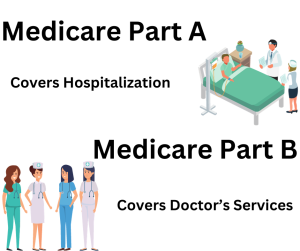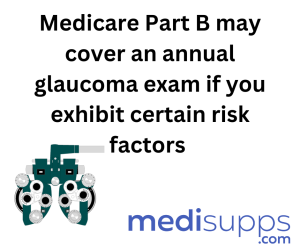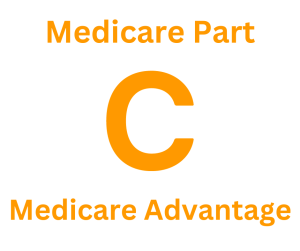
by Russell Noga | Updated December 14th, 2023
 Many people on Medicare have a lot of questions when it comes to vision coverage, especially when it comes to understanding how Medicare fits into the picture.
Many people on Medicare have a lot of questions when it comes to vision coverage, especially when it comes to understanding how Medicare fits into the picture.
Contrary to popular belief, Medicare’s coverage for vision care is not as straightforward as one might expect.
In this article, we’ll debunk common misconceptions and provide a comprehensive overview of vision care coverage under Medicare, including the answer to the question, “Does Medicare cover eyeglasses?”
We’ll also discuss supplemental options and tips for maximizing coverage and savings. Let’s embark on this eye-opening journey together.
Key Takeaways
- Original Medicare does not cover routine eye exams or eyeglasses, but other options such as Medicare Advantage may be necessary for comprehensive vision benefits.
- Medigap plans do not typically cover basic vision benefits, while standalone plans offer various levels of coverage and employer-sponsored programs provide opportunities for savings on vision care.
- Maximize coverage by comparing Medicare Advantage plans, shopping judiciously for eyewear, and considering additional coverage options.
Medicare’s Role in Covering Eyeglasses
While Medicare is known for providing healthcare coverage to millions of Americans, it only partially covers vision care. Original Medicare, which comprises Part A (hospital insurance) and Part B (medical insurance), focuses on covering vision care related to medical necessity and high-risk individuals.
On the other hand, some Medicare Advantage plans may offer more comprehensive Medicare coverage for vision care services, making them a popular choice for those seeking additional benefits.
You must recognize that Original Medicare’s coverage for vision care has its limitations. For instance, it does not cover routine eye exams or eyeglasses. However, certain circumstances warrant coverage, such as post-cataract surgery, or for people with particular medical conditions.
We will further elucidate the specifics of vision coverage under both Original Medicare and Medicare Advantage plans in the subsequent parts of this article.
Original Medicare and Eyeglasses
Original Medicare provides coverage for vision care related to injury, illness, or specific eye scans, but not for routine eye exams or eyeglasses. This means that if you rely solely on Original Medicare, you’ll need to bear the full cost of routine eye exams and eyeglasses or contact lenses.
With this in mind, you should consider other options if eye care is a priority for you. Medicare Advantage plans, which we’ll discuss in the next section, may provide more extensive coverage for vision care services and products, making them a valuable option for those seeking comprehensive vision benefits.
Medicare Advantage Plans and Vision Benefits
Medicare Advantage plans, an alternative to Original Medicare, are provided by private, Medicare-approved insurance companies. These plans frequently offer vision benefits that encompass routine examinations, eyeglasses, and contact lenses.
However, not every Medicare Advantage plan provides vision benefits, so it’s important to carefully review plan options before making a decision.
Many Medicare Advantage plans include routine vision benefits but may also limit how often you can get a new pair of glasses. Keep these restrictions in mind when selecting a plan to make sure it aligns best with your personal needs.
Compare Rates in 1 Easy Step
Enter Zip Code
Understanding Different Types of Vision Coverage
Medicare’s coverage for vision care services, procedures, and supplies, such as corrective eyewear, varies depending on several factors.
For example, Original Medicare does not provide vision coverage for routine eye exams or eyeglasses, whereas Medicare Advantage plans generally offer more comprehensive coverage and cost-effective rates for vision care, including medicare cover eyeglasses. To better understand the extent to which Medicare cover vision, it’s essential to explore the differences between Original Medicare and Medicare Advantage plans.
In the subsequent parts of this article, we will clarify the details of Medicare’s coverage for eye exams and corrective lenses, thereby aiding in your understanding of the various available vision coverage types.
Eye Exams and Medicare
Medicare covers eye exams related to injury, illness, or specific eye scans, but not routine eye exams for the purpose of obtaining eyeglasses or contact lenses. However, Medicare Part B may cover an annual glaucoma exam if you have certain risk factors for the disease, such as a family history of glaucoma or diabetes.
Note that once the Medicare Part B deductible is fulfilled, Medicare will cover 80% of the Medicare approved amount for each eye exam, leaving the individual to cover the remaining 20%. This cost-sharing model is applicable irrespective of the severity of the person’s vision issue.
Corrective Lenses: When Are They Covered?
Medicare covers cataract surgery, including traditional surgical techniques, and provides coverage for corrective lenses only after the surgery with an intraocular lens implant when obtained from a Medicare-approved supplier. The reason for this coverage is that the intraocular lens implant may not fully correct vision, necessitating additional corrective lenses for optimal vision.
Upon meeting the Part B deductible, Medicare covers 80%, and you are responsible for 20% of Medicare’s approved amount for corrective lenses following each cataract surgery. To find a Medicare-approved supplier for corrective lenses, you can visit the Medicare website and use their “Find medical equipment & suppliers” tool to search for suppliers in your area.
 Supplemental Options for Vision Care
Supplemental Options for Vision Care
If you’re looking for more extensive vision care coverage, supplemental options like Medigap, standalone vision insurance plans, and employer-sponsored or discount programs are available. It’s important to investigate these alternatives to secure the most beneficial coverage for your eye care requirements.
We will outline the specifics of these supplemental options in the following parts of this article, offering useful insights to help guide your decisions regarding your vision care coverage.
Medigap and Vision Benefits
Medigap, also known as Medicare Supplement Insurance, is a supplemental insurance policy sold by private companies. While Medigap plans generally assist in covering the expenses associated with services covered by Original Medicare, they do not typically offer coverage for vision benefits.
However, some insurance providers may provide separate vision coverage options or extra benefits for an additional monthly plan premium.
Although Medigap plans may not directly cover basic vision benefits, they can help manage the costs associated with vision care services covered under Original Medicare. By filling gaps in Original Medicare coverage, Medigap insurance allows for more accurate budgeting for vision care expenses.
Standalone Vision Insurance Plans
Standalone vision insurance plans offer various levels of coverage and can be purchased from private insurers. These specialized insurance plans typically cover:
- Routine eye exams
- Prescription eyewear (glasses or contacts)
- Sometimes additional benefits, such as frames allowance or discounts on vision care expenses.
When weighing up a standalone vision insurance plan, investigating different providers and plans is key. Compare the levels of coverage, costs, and network providers to make sure you’re getting the best return on your investment.
By doing so, you can choose a plan that best fits your individual vision care needs and budget.
Employer-Sponsored and Other Discount Programs
Employer-sponsored vision care programs, retailer discount programs, and local optometrists may offer additional options for vision care savings and coverage.
Employer-sponsored plans typically provide coverage for eye exams, discounted services, and access to a wide range of doctors, while retailer discount programs partner with a network of providers to offer reduced services and products to program members.
To fully utilize these additional coverage options, it’s necessary to investigate and compare different programs. Consider aspects like:
- coverage
- costs
- network providers
- overall value
By doing so, you can maximize your vision care coverage and savings, ensuring that you receive the best possible care for your eyes.
Special Cases: Diabetes, Glaucoma, and Macular Degeneration
In some instances, Medicare offers coverage for specific vision care services for those with diabetes, glaucoma, and macular degeneration. For those affected by these conditions, comprehending this coverage is vital as it can significantly influence their eye care and overall health.
In the forthcoming parts of this article, we will delve into the specifics of Medicare’s coverage for vision care services related to diabetes, glaucoma, and macular degeneration, thus providing useful information for individuals affected by these conditions.
Diabetic Eye Care and Medicare
Medicare Part B covers annual eye exams for individuals with diabetic retinopathy, a condition that affects the eyes of people with diabetes. Diabetic retinopathy can lead to severe consequences, such as blindness and retinal detachment if left untreated.
Therefore, it’s imperative for people with diabetes to have regular eye check-ups to keep track of their eye health and promptly address any vision issues.
By covering these annual eye exams, Medicare helps ensure that individuals with diabetic retinopathy receive the necessary care and treatment to maintain their vision and overall eye health.
Glaucoma Screening for High-Risk Individuals
Individuals considered to be at high risk for developing glaucoma are eligible for Medicare’s coverage of glaucoma screening. High-risk factors include a family history of glaucoma, diabetes, and certain racial and ethnic backgrounds.
Medicare Part B provides an annual glaucoma screening for those at high risk, covering the cost of a dilated eye exam and additional tests.
With this coverage, Medicare helps to ensure that high-risk individuals receive the necessary screening and early detection of glaucoma, allowing for timely treatment and management of the condition to prevent vision loss.
 Macular Degeneration Treatment Services
Macular Degeneration Treatment Services
Medicare Part B may cover treatment services for macular degeneration, a condition characterized by the gradual loss of central vision. This coverage typically includes:
- Certain doctors’ services
- Outpatient care
- Medical supplies
- Preventive services
- Specific injectable treatments
- Necessary tests for diagnosis and treatment
By covering these treatment services, Medicare helps individuals with macular degeneration manage their condition and maintain their vision, ensuring that they receive the necessary care to preserve their quality of life.
Tips for Maximizing Vision Coverage and Savings
To make the most of your vision coverage and savings, you should compare Medicare Advantage plans, shop judiciously for eyewear, and ponder over additional coverage options. By taking the time to research and evaluate different plans and options, you can ensure that you’re receiving the best possible coverage and value for your vision care needs.
In the next sections, we will offer helpful tips and advice on optimizing your vision coverage and savings. It will aid you in making informed decisions about your eye care, ensuring that you receive the most suitable care for your eyes.
 Comparing Medicare Advantage Plans
Comparing Medicare Advantage Plans
When comparing Medicare Advantage plans for vision coverage, consider the following factors:
- Premiums
- Cost-sharing
- Network coverage
- Supplemental benefits
- Overall Value
Carefully examine plan details and compare specific plan features using tools like Medicare.gov/plan-compare or by calling 1-800-MEDICARE. By doing so, you can make an informed decision about which Medicare Advantage plan offers the best vision coverage for your needs.
Keep in mind that the level of vision benefits varies across different Medicare Advantage plans. Hence, reviewing and comparing plan options is vital to ensure you get the coverage and benefits that align best with your personal needs.
Shopping Smart for Eyewear
To save money on eyewear, consider shopping during sales, using Health Savings Account (HSA) funds, or exploring online retailers for more affordable options. Some online retailers that offer advantageous offers and selections for eyewear include GlassesUSA, EyeBuyDirect, Warby Parker, Zenni Optical, and Eyebuydirect.
When purchasing eyeglasses online, measure your face, contemplate your face shape, inspect frame dimensions, read customer reviews, and examine the return policy to guarantee a suitable fit. By following these tips, you can ensure that you receive the best possible eyewear for your vision needs while minimizing costs.
Compare Medicare Plans & Rates in Your Area
Summary
In conclusion, understanding the complexities of vision care coverage under Medicare is crucial for those seeking the best possible care for their eyes.
By exploring the various options available, such as Original Medicare, Medicare Advantage plans, Medigap, standalone vision insurance plans, and employer-sponsored or discount programs, you can make informed decisions about your vision care coverage and ensure that you receive the necessary services and treatments to maintain your eye health.
With the right knowledge and resources at your disposal, you can confidently navigate the world of vision care coverage and maximize your savings for a brighter future.
Compare 2024 Plans & Rates
Enter Zip Code
Frequently Asked Questions
How much does Medicare pay towards glasses?
Medicare Part B does not typically pay for routine vision screening, glasses or contact lenses, however it may cover testing and treatment for certain conditions such as macular degeneration and cataracts. In the case of cataract surgery, Medicare will provide coverage for one set of corrective lenses.
Does Medicare take care of eyes?
No, Medicare generally doesn’t cover routine eye exams or eyeglasses/contact lenses. However, it does cover certain eye care services for those with a chronic eye condition like cataracts or glaucoma.
What vision benefits do Medicare Advantage plans offer?
Medicare Advantage plans offer vision benefits such as coverage for routine eye exams, eyeglasses, and contact lenses, however this varies depending on the plan.
Are there any supplemental options for vision care?
Yes, there are supplemental options for vision care such as Medigap, standalone vision insurance plans, and employer-sponsored or discount programs.
How can I maximize my vision coverage and savings?
Maximize your vision coverage and savings by comparing Medicare Advantage plans, shopping smart for eyewear, and looking into additional coverage options.
Find the Right Medicare Plan for You
Finding the right Medicare plan doesn’t have to be confusing. Whether it’s a Medigap plan, or you have questions about Medicare Advantage or Medicare Part D, we can help.
Call today at 1-888-891-0229 and one of our knowledgeable, licensed insurance agents will be pleased to aid you!

Russell Noga is the CEO and Medicare editor of Medisupps.com. His 15 years of experience in the Medicare insurance market includes being a licensed Medicare insurance broker in all 50 states. He is frequently featured as a featured as a keynote Medicare event speaker, has authored hundreds of Medicare content pages, and hosts the very popular Medisupps.com Medicare Youtube channel. His expertise includes Medicare, Medigap insurance, Medicare Advantage plans, and Medicare Part D.



